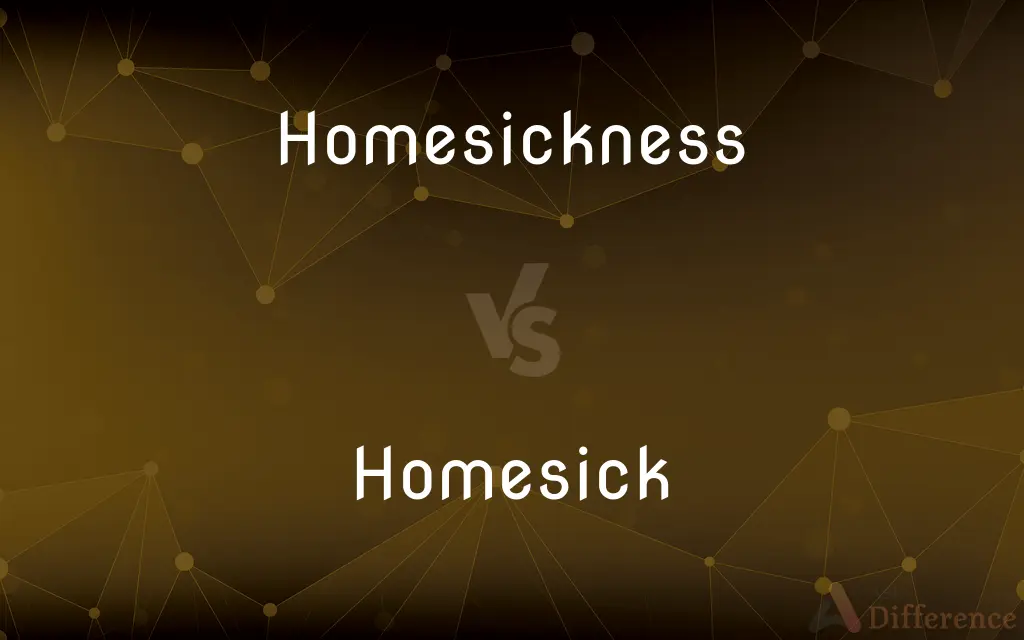Homesickness vs. Homesick — What's the Difference?
By Urooj Arif & Fiza Rafique — Updated on March 10, 2024
Homesickness is a state of emotional distress caused by being away from home, characterized by longing and sadness, while homesick is the adjective describing someone experiencing this feeling.

Difference Between Homesickness and Homesick
Table of Contents
ADVERTISEMENT
Key Differences
Homesickness refers to a complex emotional and psychological response to being separated from one’s familiar home environment, often involving feelings of nostalgia, sadness, and distress. On the other hand, homesick is used to describe the condition or feeling of missing home, typically experienced by individuals when they are away from their usual place of residence for a significant period.
Homesickness can manifest in various forms, such as anxiety, depression, and trouble focusing on tasks at hand due to the overwhelming desire to return home. Whereas, being homesick often results in longing for familiar comforts, people, and routines that one associates with their home, impacting one’s emotional state and well-being.
The intensity and duration of homesickness can vary greatly among individuals, influenced by factors such as the distance from home, the length of time away, and personal coping mechanisms. Conversely, someone who is homesick may experience these feelings acutely during certain times, such as during holidays or significant personal dates, but may also find ways to manage or mitigate these emotions over time.
Coping strategies for homesickness can include maintaining regular contact with family and friends, engaging in familiar activities, or seeking support from peers or professionals. On the other hand, a homesick individual might find relief in creating a comforting personal space that reminds them of home, or by planning visits back to their hometown.
Understanding homesickness involves recognizing it as a natural, albeit challenging, part of adapting to new environments. Being homesick, while uncomfortable, can also lead to personal growth and the development of resilience as individuals learn to navigate their feelings and adapt to change.
ADVERTISEMENT
Comparison Chart
Definition
The emotional distress caused by being away from home.
The feeling or condition of longing for home.
Nature
A state or condition.
An adjective describing someone experiencing the state.
Manifestation
Can include a range of emotions and behaviors.
Specifically refers to the feeling of missing home.
Coping
May involve various strategies to deal with the distress.
The individual's emotional response to the condition.
Duration
Can last for an extended period until adjustment occurs.
May come in waves or be felt more consistently.
Compare with Definitions
Homesickness
A longing for the comfort, safety, and familiarity of home.
Despite the excitement of studying abroad, he couldn't shake off his homesickness.
Homesick
Experiencing emotional distress due to separation from home.
He was homesick during his first semester at university but eventually adjusted.
Homesickness
A condition that can lead to significant stress and anxiety.
Without proper support, homesickness can evolve into more serious mental health issues.
Homesick
Desiring to return to one’s home and familiar surroundings.
Weeks into his trip, he grew homesick for his family’s weekend dinners.
Homesickness
The distress or impairment caused by an actual or anticipated separation from home.
Her homesickness intensified as the holiday season approached.
Homesick
Feeling sad because you are away from home and missing it.
She felt homesick after moving to a new city for her job.
Homesickness
An experience that many people go through when adjusting to a new place.
Joining local clubs helped her combat her homesickness.
Homesick
Wishing for the comfort and security of one’s own home.
Even amidst the beauty of her travels, she was homesick for her own bed.
Homesickness
Emotional discomfort stemming from being away from one’s home environment.
The first year away at college is often marked by homesickness.
Homesick
The state of longing for home while being in a new or unfamiliar environment.
The exchange student felt homesick in the early days of her program.
Homesickness
Homesickness is the distress caused by being away from home. Its cognitive hallmark is preoccupying thoughts of home and attachment objects.
Homesick
Experiencing a longing for one's home during a period of absence from it
He was homesick for America after five weeks in Europe
Homesickness
A feeling of longing for one's home during a period of absence from it
I lived four years in London without a single pang of homesickness
Homesick
Acutely longing for one's family or home.
Homesickness
Acutely longing for one's family or home.
Homesick
(often with for) Missing one's home and family very much when away; nostalgic.
Homesickness
The characteristic of being homesick; a strong, sad feeling of missing one's home (and often left-behind loved ones, such as family and friends) when physically away.
Homesick
Pining for home; in a nostalgic condition.
Homesickness
A longing to return home
Homesick
Unhappy at being away and longing for familiar things or persons
Common Curiosities
How can I cope with homesickness?
Coping strategies include staying connected with loved ones, engaging in familiar activities, and seeking support from peers or professionals.
How do I know if I'm homesick?
You might be homesick if you feel a persistent longing for home, sadness, or emotional distress thinking about your home environment.
What causes homesickness?
Homesickness is caused by being away from one’s familiar and comforting home environment, often triggered by a significant life change or move.
How long does homesickness last?
The duration of homesickness varies among individuals; it can last from a few days to several months, depending on various factors.
Can homesickness affect your health?
Yes, severe homesickness can lead to stress, anxiety, and depression, impacting one's physical and mental health.
Can adults experience homesickness?
Yes, adults can experience homesickness, especially when moving to new places, traveling for work, or studying abroad.
What role does technology play in coping with homesickness?
Technology helps in staying connected with family and friends through calls, messages, and social media, easing the feeling of separation.
Are there any benefits to experiencing homesickness?
Experiencing homesickness can lead to personal growth, resilience, and a greater appreciation for one’s home and loved ones.
Is homesickness a sign of weakness?
No, homesickness is a natural emotional response to being separated from one’s familiar surroundings and does not indicate weakness.
Can making new friends reduce homesickness?
Yes, forming new relationships and connections can provide support and reduce feelings of homesickness.
Is it possible to prevent homesickness?
While it might not be entirely preventable, preparing for changes, maintaining connections, and having coping strategies can mitigate its effects.
How can schools help students with homesickness?
Schools can offer support through counseling services, social events, and orientation programs to help students adjust and feel more at home.
What's the difference between being homesick and missing someone?
Being homesick involves missing one’s home environment and everything associated with it, while missing someone is specifically about longing for a particular person.
Does everyone get homesick?
Not everyone experiences homesickness; it varies based on personality, life experiences, and the context of being away from home.
Is there a difference in how homesickness is experienced in different cultures?
Cultural background can influence how homesickness is experienced and expressed, with some cultures having more communal ways of coping and supporting each other.
Share Your Discovery

Previous Comparison
Marled vs. Merled
Next Comparison
Columbia vs. ColombiaAuthor Spotlight
Written by
Urooj ArifUrooj is a skilled content writer at Ask Difference, known for her exceptional ability to simplify complex topics into engaging and informative content. With a passion for research and a flair for clear, concise writing, she consistently delivers articles that resonate with our diverse audience.
Co-written by
Fiza RafiqueFiza Rafique is a skilled content writer at AskDifference.com, where she meticulously refines and enhances written pieces. Drawing from her vast editorial expertise, Fiza ensures clarity, accuracy, and precision in every article. Passionate about language, she continually seeks to elevate the quality of content for readers worldwide.















































